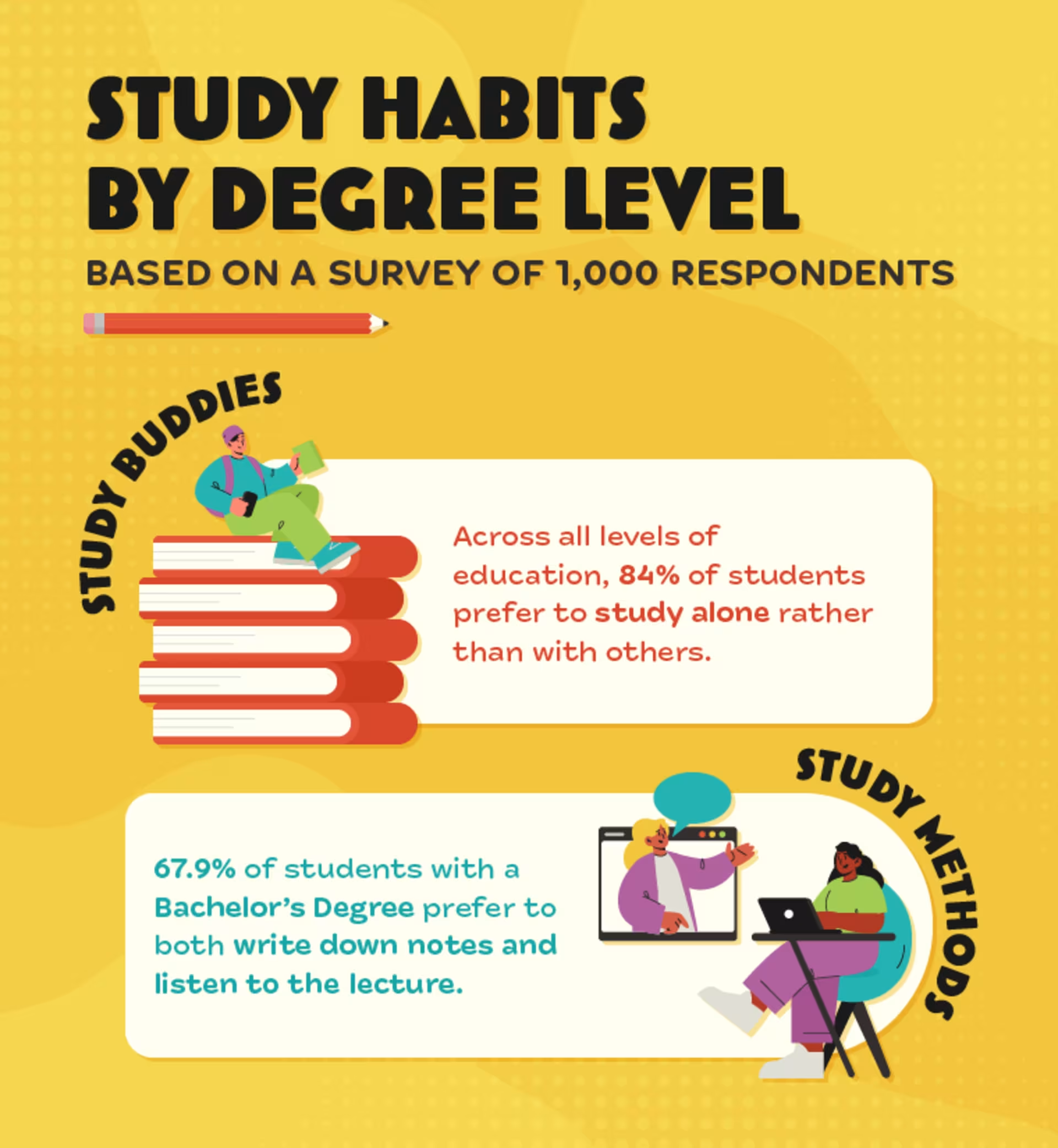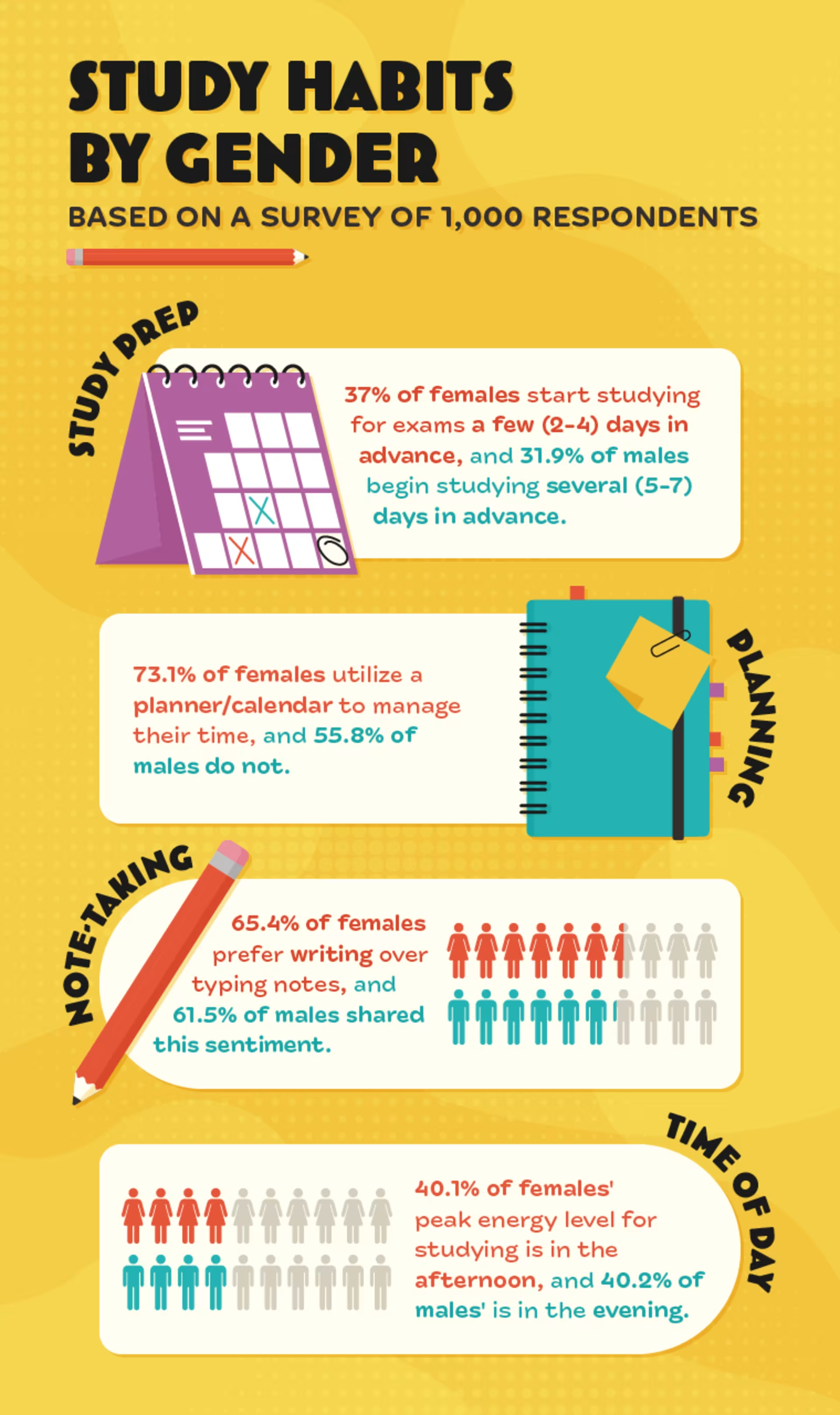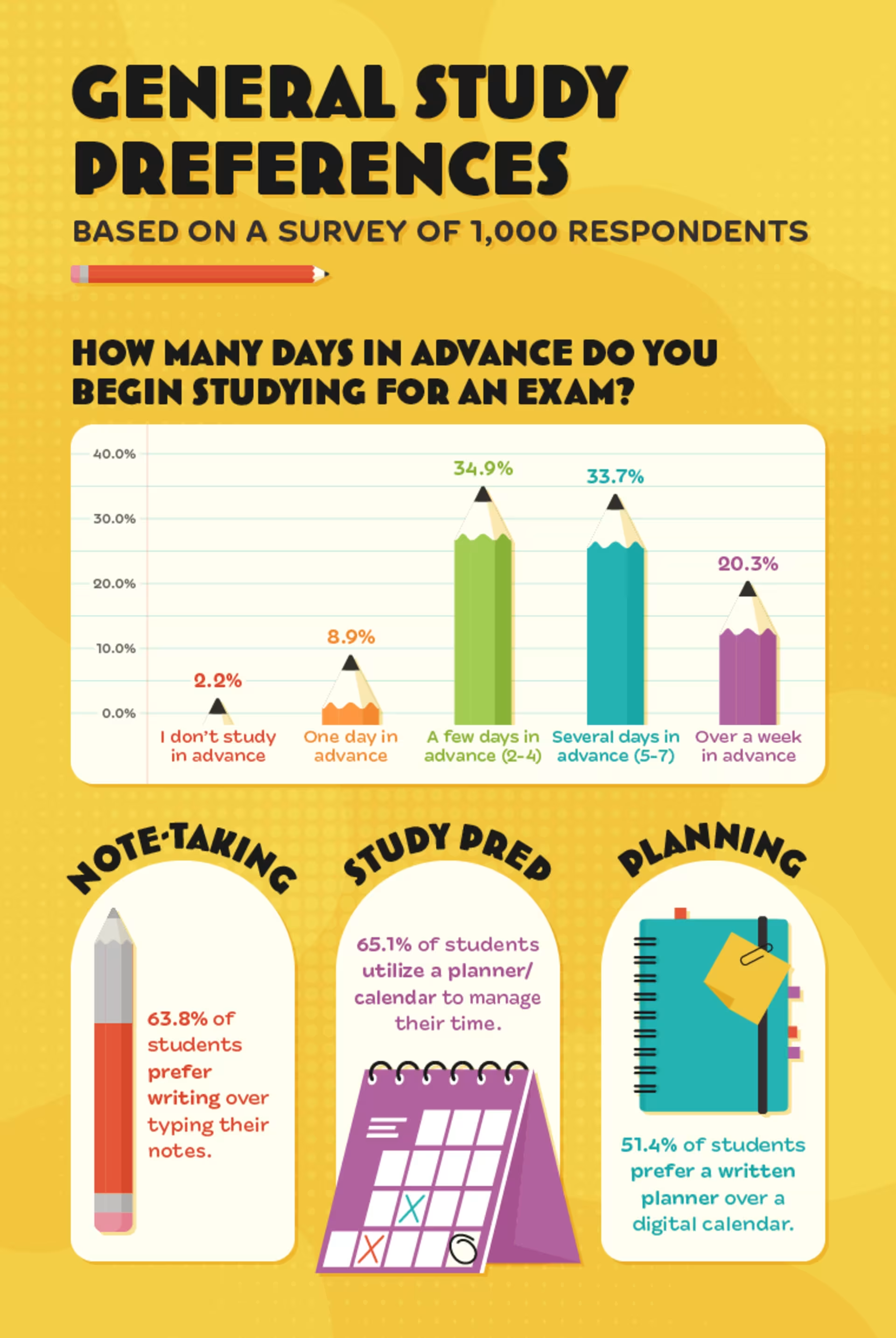Read time 6 minutes
Published on Mar 31, 2022
When you think about a day in the life of a college student, there are probably a few things that come to mind. Maybe you think of attending lectures, hanging out with friends or cheering at sporting events. But there’s one universal experience that nearly any college student can relate to–studying.
While all students must do it in some form or another, studying can look very different depending on the person and even the degree level. Whether you prefer to stay up late or wake up early to cram for an exam, everyone has their own habits and preferences. At Grand Canyon University (GCU), we know the best studying method is the one that works best for you. So that got us thinking: how are students across the country studying?
GCU’s partner, Grand Canyon Education (GCE), conducted a national survey to uncover the trends in study habits for students around the U.S. Read on to see what we found out!
Methodology
Survey respondents were pre-screened for their student status, and responses were collected from over 1,000 active students across all levels of education. We collected results from only those who currently identify under a student status at any education level. We asked questions around study timing, location, snacks, strategies, organization and more. Responses were analyzed across levels of education, area of study and gender.
How Much Are Students Studying?

Before we dive into how people are studying, we wanted to know how much time students are devoting to it. Roughly half of our respondents (50.5%) said they spend, on average, less than two hours per day hitting the books. Another third of students (34.4%) say their time allotted for studying falls into the three-to-four-hour range and 15% of students regularly study more than five hours a day.
Similarly, students are most likely to spend somewhere between six to 10 hours per week studying, with 22.7% of respondents falling in this range. The group of students studying Agriculture/Veterinary (29.4%) and Education (31.6%) said they study zero to five hours per week. However, students in Business (28.2%), Engineering/Manufacturing/Construction (25.42%), Health/Welfare (20.12%), Humanities/Arts (24.6%) and Sports (33.3%), said they study six to 10 hours per week.
Several factors can impact the time students have to put toward studying–the biggest one being whether the student is financially responsible for themselves. Students who also work, face major time constraints in their schedule. Many students holding an on- or off-campus position (37.4%) reported they work less than five hours per week; however, another 18.5% said they work nearly full-time, 36 or more hours a week.
Being a student is a full-time job itself, though there are many benefits to working while pursuing a degree. Outside of the financial support, a job may provide students with valuable work experience that can launch their careers post-grad. Likewise, students should consider the potential impacts and distractions that come along with having a job while in school, such as keeping up with coursework and grades.
Breaking Down Study Habits by Degree

Digging deeper, we also analyzed our survey results based on the level of degree respondents have attained. Some of our results were unsurprising. We found that the higher the degree, the more time students spend studying. For example, 35.8% of students with a bachelor's degree said they study three to four hours per day and only a quarter (25%) of students with an associate's degree shared this sentiment.
However, some study habits are widespread across degrees. For instance, the majority of students, despite degree level, agree they study more effectively alone. While there are certainly outliers, study groups are in the minority of student study routines at just 16% of respondents preferring a study partner.
Interestingly enough, students with a bachelor’s degree (67.9%) are the least likely to multitask during a lecture, with almost one in five students (19.5%) reporting they’d rather just focus on writing notes than listening to the lecture. At the high school, associate, master and doctorate levels, the majority of students would rather simultaneously listen and take notes.
Even down to the time of day that people prefer to study, there is differentiation between degree levels. The largest percentage of students with an associate's degree (38.5%) said that their peak energy level for studying is in the afternoon, and students with a bachelor’s (36.5%) and master’s (38.7%) degree said their most productive time to study is in the evening. In contrast, doctoral (50%) degree students share an equally strong preference for morning and evening study times.
How Gender Affects Studying

Next, we sought to analyze whether gender plays a role in how people study. For starters, females (73.1%) are more likely to use a planner or calendar to stay organized than males (44.2%).
However, the planner doesn’t necessarily correlate to getting things done earlier. When it comes to exams, the largest portion of females (37%) say they start studying a few days (two to four) in advance. Males, on the other hand, are more likely (31.9%) to start studying several days (five or more) in advance.
In addition, females are more likely to study in the afternoon (40.1%) while males prefer to do their prep work in the evening (40.2%).
While there are certainly some differences in study preference across gender, males (61.5%) and females (65.4%) alike reported that they prefer writing notes over typing them. Across genders, respondents agreed–when it comes to studying, there is no place like home!
The Ideal Study Setting

Speaking of settings, no study session is complete without a few snacks and drinks to keep the energy levels up. According to our analysis, popcorn is the most popular snack while studying, beloved by 23.2% of students. Other fan favorites include fruits, crackers, granola bars and trail mix, respectively.
For a beverage, water is the go-to for nearly three in 10 students (28.2%), closely followed by iced coffee (25.7%) and hot coffee (14.9%). 11.2% of students prefer either hot or iced tea, and 6.5% grab an energy drink to keep them going.
DJ, start the music! 41.8% of students say their ideal soundscape while studying is music, and of those music-lovers, 56.9% prefer to listen to ambient or chill music. (Please note that we excluded respondents that said ‘other’ or ‘I do not listen to music while studying’ for the sake of this analysis.) Classical, electronic and instrumental music are also popular categories. Studies have shown that music can improve studying by helping with mood, motivation and memory.(See disclaimer 1)
On the other hand, 38.3% study best in silence with no distractions. So, if you’re planning on studying with others, it’s best to grab a set of headphones just in case!
An Analysis on Organizational Study Habits

With so many different classes and assignments to keep track of, it’s critical that students stay organized throughout their study routines. 65.1% of students do this using a planner or calendar that allows them to manage time.
While there are many online apps and programs designed to help students do just that, our research shows that it’s hard to beat the classic pen and paper method. Over half of the students said they prefer a written calendar over a digital one. Similarly, 63.8% prefer handwriting over typing their notes. There are many mixed opinions on this subject matter, though many argue that handwriting notes help with improved learning and long-term memory.(See disclaimer 2)
Closing Thoughts
No matter what your major, gender or education level is, studying is a critical component of learning. Whether it’s done in the library or at a local coffee shop, with tea or coffee, what matters most is that you’re doing it. GCU understands the challenges students face when trying to balance life and school by offering several learning resources. From career resources to learning tutorials, and student discounts to academic support resources, GCU wants you to succeed.
To maximize your study sessions, you should not only identify a routine that works for you, but also study material that you’re truly passionate about. Grand Canyon University offers over 240 online programs, including over 100 online degree programs, over 100 online emphases and over 25 online certificate programs.(See disclaimer 3) We’re confident you can find a degree program that you love. Use our degree program finder to start the next chapter of your education journey today!
Retrieved from:
(See disclaimer 1) Healthline, Music and Studying: It's Complicated in February 2022
(See disclaimer 2) Scientific American, A Learning Secret: Don’t Take Notes with a Laptop in February 2022
(See disclaimer 3) As of June 30, 2021





